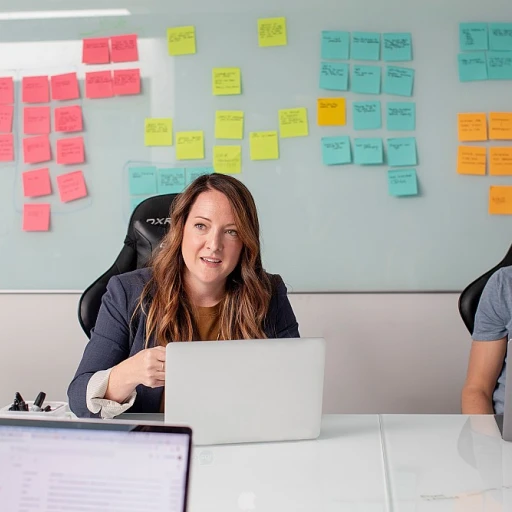
Understanding the Growth Mindset
The Essence of Adopting a Learning Mindset
Cultivating a growth mindset in the workplace begins with understanding the foundational concepts that differentiate this perspective from a fixed one. A growth mindset, a term popularized by psychologist Carol Dweck, is the belief that skills and intelligence can grow with effort, learning, and practice. In contrast, a fixed mindset suggests that abilities are static and unchangeable. The significance of fostering a growth mindset extends beyond personal development. It affects team dynamics, employee engagement, and ultimately, workplace success. Businesses today are increasingly recognizing the importance of encouraging continuous learning among employees to adapt to ever-changing work landscapes. Aligning with this mindset, organizations can develop a culture where challenges are seen as opportunities for growth. This mindset culture fosters resilience in teams, equipping employees with problem-solving skills and the confidence to innovate. A workplace that values the learning and development (L&D) of its employees often sees enhanced performance and greater job satisfaction. Employees with a growth mindset are more likely to embrace professional development opportunities. They view feedback as a valuable tool for learning, rather than criticism, which supports their journey toward continual improvement. Such a mindset transforms how individuals perceive their roles and potential, significantly impacting employee growth. To facilitate this, businesses can set clear development goals that focus on both personal and organizational growth. A comprehensive understanding of how to cultivate this mindset enables organizations to harness the full potential of their workforce, paving the way for sustained success. For more insights on establishing effective goals in the workplace, explore the benefits here.The Role of Leadership in Fostering Growth
Leadership's Influence on Mindset Culture
In the evolving landscape of work, leadership plays a pivotal role in shaping the mindset culture within organizations. Leaders are not just managers; they are the architects of the workplace environment that encourages growth and learning. A leader's approach can significantly influence whether a team adopts a growth mindset or remains entrenched in a fixed mindset.
Effective leaders understand the importance of fostering a culture where continuous learning and development are prioritized. They recognize that their actions and attitudes set the tone for the entire organization. By modeling a growth mindset themselves, leaders can inspire their teams to embrace challenges and view setbacks as opportunities for learning and improvement.
Encouraging a Learning Mindset
Leaders can encourage a learning mindset by promoting open communication and encouraging employees to share their ideas and experiences. This openness helps in building trust and makes employees feel valued, which is crucial for their professional development. When employees see that their leaders are committed to learning and growth, they are more likely to adopt the same mindset.
Moreover, leaders should provide opportunities for employees to develop new skills and engage in problem-solving activities. This can be achieved through regular training sessions, workshops, and mentorship programs. By investing in the development of their teams, leaders not only enhance the skills of their employees but also contribute to the overall success of the business.
Addressing Challenges with Leadership
However, fostering a growth mindset is not without its challenges. Leaders must be prepared to address resistance to change and help employees transition from a fixed mindset to a growth mindset. This requires patience, empathy, and a strategic approach to change management. Leaders should also be aware of the potential challenges in HR training processes and seek ways to address these effectively. For more insights on overcoming these challenges, you can explore addressing challenges in HR training processes for the future of work.
Ultimately, the role of leadership in fostering a growth mindset is about creating an environment where employees feel empowered to learn, grow, and succeed. By prioritizing a mindset culture that values growth and development, leaders can drive their organizations towards greater innovation and success.
Training and Development Programs
Training and Development Initiatives: Paths to a Growth Mindset
Implementing training and development programs is a crucial step for organizations aiming to nurture a growth mindset among their employees. By designing initiatives that emphasize continuous learning and development, businesses can better equip their teams to tackle challenges with a growth-oriented perspective. Incorporating structured learning opportunities, such as workshops and seminars focused on mindset culture, is essential. These sessions encourage employees to embrace new skills and problem-solving strategies beyond the constraints of a fixed mindset. Introducing professional development activities also allows individuals to engage with content that fosters a curiosity-driven approach, ensuring that they can adapt to evolving business needs. Another effective strategy is to facilitate mentorship and coaching programs. These avenues provide employees with tailored guidance, personalized feedback, and the motivation they need to cultivate mindset growth. When organizations align their leadership with these goals, they create a nurturing environment where employees feel supported in their journey to develop growth-centric capabilities. Moreover, leveraging technology plays a pivotal role in promoting a learning mindset at work. Implementing online learning platforms and resources enables employees to access diverse materials tailored to their specific development requirements. By offering such opportunities, organizations not only empower individuals growth but also strengthen teams' overall skill sets. Given the increasingly dynamic nature of modern work environments, it's crucial that businesses recognize the profound impact of employee growth on their success. By investing in strategic training and development solutions, organizations can foster a culture where learning is valued, supporting both employee engagement and long-term business outcomes. For more insights on enhancing skills, explore this resource on enhancing skills for tomorrow's workforce.Creating a Safe Environment for Experimentation
Encouraging Innovation Through Safe Experimentation
In today's rapidly evolving work environment, creating a culture where employees feel empowered to learn and experiment is crucial for success. Training and development programs are important, but without a safe space to apply what they learn, growth can stagnate. Encouraging experimentation allows for the cultivation of a growth mindset, where individuals feel free to challenge the status quo and step outside their comfort zones without the fear of failure. Fostering this mindset within your organization entails developing an environment where employees are assured that mistakes are part of the learning process. Employees will then feel more comfortable engaging with new ideas, practices, and technologies, leading to innovative solutions for the business.- Build a Culture of Psychological Safety: Leaders play a pivotal role in promoting a safe learning environment. By exemplifying openness and acceptance of failure as a learning opportunity, they encourage employees to share their ideas freely. This approach nurtures a mindset of continuous learning and development, as individuals feel safe to innovate.
- Encourage Cross-functional Collaboration: Encourage employees from different teams to collaborate on projects. This cultural strategy fosters a learning mindset across the organization, enabling employees to develop diverse skills and improve their problem-solving abilities. Exposure to different perspectives enhances a team's capacity to address challenges creatively.
Feedback and Recognition Systems
Encouraging Constructive Feedback and Acknowledgement
Creating an environment where feedback is valued is essential for cultivating a mindset of continuous learning and growth. Feedback mechanisms that are thoughtful and intentional can significantly influence an employee's development. When delivered in a constructive manner, feedback acts as a powerful tool to motivate employees. It not only highlights areas for improvement but also reinforces the progress they have made. Emphasizing the importance of both formative feedback—ongoing, developmental feedback—and summative feedback—evaluative feedback given at the end of a task—can support a learning mindset culture. Recognition systems that celebrate employee achievements and milestones further reinforce positive behaviors. They can help shift a workplace from a fixed mindset, where talent is seen as static, to one that acknowledges the potential for growth.- Constructive Feedback: Encourage open dialogues between team members and leadership. This builds trust and openness to constructive criticism, which can help shift perspectives from a fixed mindset to a growth mindset.
- Recognizing Efforts: Implement systems that recognize not just success but also effort, resilience, and problem solving. This holistic appreciation fosters a supportive environment where employees feel their contributions are valued, encouraging further investment in personal growth.
Leveraging Technology to Support Growth
Integrating Technology to Enhance Growth Opportunities
In today's fast-paced business landscape, technology serves as a crucial ally for organizations aiming to foster a learning mindset. Embracing digital tools empowers both leadership and L&D teams to effectively support individual and team growth.- Learning Platforms: Leveraging platforms that facilitate continuous learning can significantly enhance employee growth. These systems enable a personalized approach to development and cater to different learning styles, making it easier for employees to acquire new skills and embrace a growth mindset.
- Data Analytics: With advanced data analytics, businesses can track progress and identify specific areas where teams may face challenges. By analyzing feedback and performance metrics, organizations can tailor development strategies to meet individual needs, bridging the gap between where employees are and where they want to be.
- AI and Machine Learning: Artificial intelligence and machine learning tools can play a pivotal role in customizing learning experiences and offering real-time feedback. These technologies not only address immediate learning needs but also predict future skill requirements, ensuring employees are equipped for upcoming challenges.













